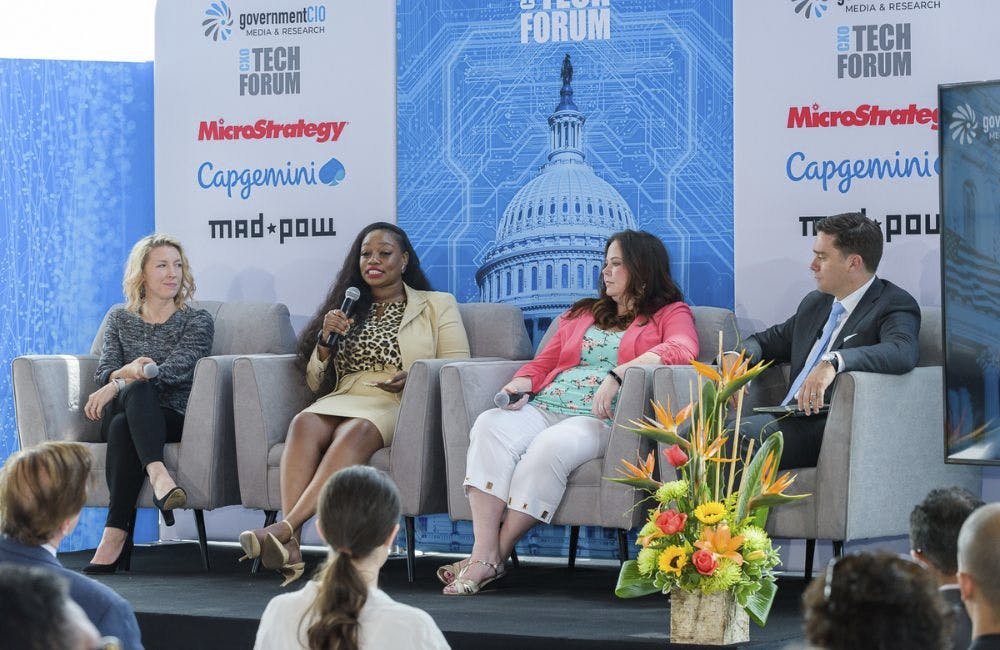USDS, GSA’s 18F Work to Streamline Procurement to Connect Tech Companies to Government

U.S. Digital Service Director of Procurement Traci Walker, 18F Director of Acquisition Ashley Owens, and Founder and CEO of Dcode Meagan Metzger spoke at the Acquisition Innovation CXO Tech Forum June 20 about solutions they have found to fast-track acquisition, making the procurement process more agile while ensuring that regulations and policies are adhered to.
One of the key challenges facing the federal acquisition process is efficiency. Laws and regulations require that acquisitions follow certain processes and include certain targets, yet when it comes to information technology, federal agencies chafe at the idea of waiting months if not years for the procurement process.
Walker said her office has led by example since its inception about five years ago. “We’ve done a lot in the realm of doing projects and showing what can be done with rapid acquisition, getting things to delivery, showing how we can bring in young, hungry companies that know how to do this in industry and helping them getting through the barriers of entry to government, and also workforce training,” she added.
Workforce training has been her latest focus, she said, to ensure that even those in USDS without a background in acquisition or contracting can obtain the knowledge and certifications to understand the process, write improved contracts and tie that work to their mission.
Ashley Owens has made acquisition more efficient at 18F through Agile and Scrum processes, allowing her office to “promote open-source, open-API [application programming interface] and human-centered design” focused on rethinking procurement.
“I can’t stress enough how much Agile is a cultural shift,” Owens said. “The government is really large, and so it makes change hard, but I’m here to break the wheel and make better procurements that will make everyone’s lives better.”
Metzger explained how Dcode acts as a nexus for government and industry to collaborate on procuring cutting-edge products for federal missions more quickly.
“We run an acceleration program for technologies that are looking to understand the government market,” she explained, connecting over 70 startups that focus on emerging technologies so far. “We also run a training program for government leaders about navigating the culture and bureaucracy of procurement,” which she called “bureaucracy jiu jitsu.”
Each of the panelists said they’ve seen encouraging trends for acquisition recently. “Acquisitions are becoming much faster for tech,” said Walker. “We’re looking at more modular, smaller contracts, which carry less risk. We’re also looking at the Missouri process – show me, don’t tell me … whether or not you’ll be successful.”
Walker also noted that she has seen companies based around Agile methodology refusing to bid on contracts that cannot be delivered with Agile, incentivizing federal agencies to rethink how they can both make opportunities flexible enough for those companies and benefit from their practices. “Currently, we have seen that they would rather not get the business then to see it not work out, so I see a lot of courage and bravery coming from industry … to come together and put in the collaboration.”
“Not only are we trying to get there faster, but there’s also the realization that the market research that we do isn’t just a check in the box for a FAR requirement,” said Metzger. “I’ve seen a big uptick – whether it’s the Air Force or DHS or almost every agency moving out to Silicon Valley, Austin and Boston, holding digital challenges and trying to reach a different population.” She expects that this effort will remove barriers between tech companies unfamiliar to federal contracting practices and federal agencies seeking their products and services.
“These technologies are not going to respond to a 100-page RFP,” she said. “If you can use a challenge as sort of a ‘down-select’ into a FAR procurement, then you’re doing something.”
Owens agreed that “nontraditional” methods are becoming more important. “We post everything in GitHub,” she said. “Openness and introspection are what is going to lead to better procurement.”
Lastly, the three panelists shared their views and hopes for acquisition in the future. “We’re making a push to have everyone in government have a product-thinking mindset, rather than a project-thinking mindset,” said Walker. “This is how technology is built in industry.”
Walker expects that a change in mindset is the first step for government procurement professionals to adopt industry practices towards more efficient acquisition, with industry experts leading the way. “The model is that we hire engineers, product managers and user experience experts because we don’t have that skillset within the government.”
Owens hoped that the procurement process would become more transparent, both within the government and with industry partners. Especially as budgets shrink, sharing best practices and standards will help agencies transform their IT systems and eliminate legacy technology, she said.
“Making procurement joyful is my tagline,” Owens said. “I say that now and the whole room laughs, but one day, it’s going to be just a thing.”
Metzger was similarly optimistic, emphasizing that “we’re thinking big and starting to act small and incrementally. I see a shift to pulling in products from the private sector … rather than reinventing the wheel every time.”
This is a carousel with manually rotating slides. Use Next and Previous buttons to navigate or jump to a slide with the slide dots
-

OPM Extends Tech Force Deadline as Program Tests New Federal Hiring Model
High demand prompted OPM to extend Tech Force applications to Feb. 2 as the agency pilots centralized, skills-based hiring.
5m read -

Nominations Now Open for GovCIO Media & Research’s CyberScape Flywheel Awards
Flywheel Award nominations are open for the April 16 CyberScape Summit, honoring top federal cyber leaders.
7m read -

FDA Outlines AI Principles for Drug Development
New FDA guidance outlines 10 principles for using AI in drug research, development and manufacturing, developed with European regulators.
3m read -

Federal AI Enters a ‘Storming Phase’ Under the Genesis Mission
National labs are working to reduce complexity, connect compute and deploy assured autonomy to speed AI research and deployment.
3m read








